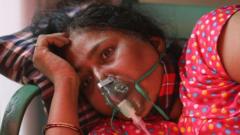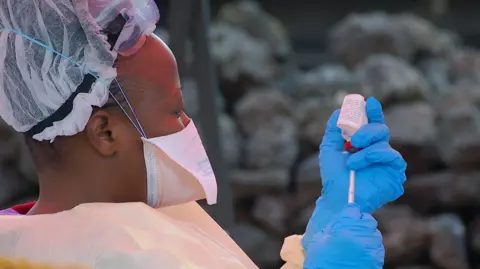In a stark retrospective, BBC journalists explore the immense challenges faced during India's COVID-19 lockdown, initially imposed on March 24, 2020, as the world braced for a pandemic that would evolve into a global catastrophe. The nation's already strained healthcare system crumbled under the pressure, with estimates indicating that over 4.7 million COVID-related deaths occurred, a figure significantly higher than the official statistics the government provided.
Amidst the overwhelming grief and despair felt across the country, BBC voices share personal anecdotes that illustrate the dire circumstances many encountered during the second wave in 2021. Soutik Biswas recalls the distressing call from a teacher whose husband desperately needed oxygen in a Delhi hospital during a peak crisis with depleted supplies. The grim reality of searching for basic necessities like oxygen and medical aid felt like a battle, and Biswas and his colleagues often found themselves intertwined in the stories they reported.
Yogita Limaye recounts heart-wrenching scenes outside hospitals where families fought desperately for attention while their loved ones succumbed to the virus. The chaos of media groups sharing messages for support exemplified the national emergency, as relatives and friends of journalists faced the same struggles for survival—losing loved ones became all too common.
Vikas Pandey’s narrative highlights both personal and professional challenges, as he fought for both the stories he covered and the well-being of family and friends or their dire circumstances as victims of the healthcare system's failures. He reflects on failed attempts to find life-saving treatments and the burden of helplessness that dominated the landscape.
Geeta Pandey recounts the discord and harrowing fear of the lockdown, emphasizing the desperation across India as families sought to reunite amidst a pandemic they scarcely understood. Her experience is lovingly intertwined with the personal, as she lost her mother before she ever had the chance to reunite during the vaccine rollout.
In a poignant visual of vulnerability and survival, Anagha Pathak shares her experience witnessing migrant laborers journeying home, emphasizing a disconnect between responsibilities as a reporter and the innate desire to assist those in need.
These shared experiences are a powerful reminder of how the pandemic's effects transcend numbers and statistics—a chilling look into the memories and scars left on both individuals and a nation. As India reflects on this tumultuous period, the stories of pain, loss, and unwavering resilience remain prevalent, shaping an indelible part of the contemporary narrative.
Amidst the overwhelming grief and despair felt across the country, BBC voices share personal anecdotes that illustrate the dire circumstances many encountered during the second wave in 2021. Soutik Biswas recalls the distressing call from a teacher whose husband desperately needed oxygen in a Delhi hospital during a peak crisis with depleted supplies. The grim reality of searching for basic necessities like oxygen and medical aid felt like a battle, and Biswas and his colleagues often found themselves intertwined in the stories they reported.
Yogita Limaye recounts heart-wrenching scenes outside hospitals where families fought desperately for attention while their loved ones succumbed to the virus. The chaos of media groups sharing messages for support exemplified the national emergency, as relatives and friends of journalists faced the same struggles for survival—losing loved ones became all too common.
Vikas Pandey’s narrative highlights both personal and professional challenges, as he fought for both the stories he covered and the well-being of family and friends or their dire circumstances as victims of the healthcare system's failures. He reflects on failed attempts to find life-saving treatments and the burden of helplessness that dominated the landscape.
Geeta Pandey recounts the discord and harrowing fear of the lockdown, emphasizing the desperation across India as families sought to reunite amidst a pandemic they scarcely understood. Her experience is lovingly intertwined with the personal, as she lost her mother before she ever had the chance to reunite during the vaccine rollout.
In a poignant visual of vulnerability and survival, Anagha Pathak shares her experience witnessing migrant laborers journeying home, emphasizing a disconnect between responsibilities as a reporter and the innate desire to assist those in need.
These shared experiences are a powerful reminder of how the pandemic's effects transcend numbers and statistics—a chilling look into the memories and scars left on both individuals and a nation. As India reflects on this tumultuous period, the stories of pain, loss, and unwavering resilience remain prevalent, shaping an indelible part of the contemporary narrative.






















